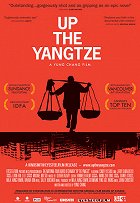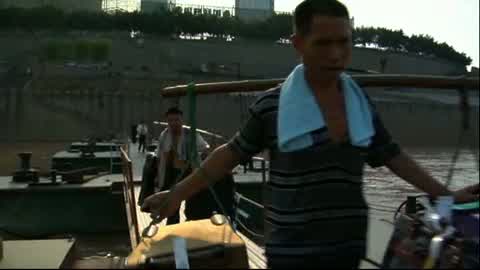Plots(1)
A luxury cruise boat motors up the Yangtze, navigating the mythic waterway known in China simply as "The River." In the biggest engineering endeavour since the Great Wall, China has set out to harness the Yangtze with the world's largest mega-dam. Meanwhile at the river's edge Yu Shui says goodbye to her family and turns to face the future. From their small patch of land, her parents watch the young woman walk away, her belongings clutched in a plastic shopping bag. The waters are rising. The Three Gorges Dam, gargantuan and hotly contested symbol of the Chinese economic miracle, provides the epic and unsettling backdrop for Up the Yangtze, a dramatic and disquieting feature documentary on life inside the 21st century Chinese dream. Stunningly photographed and beautifully composed, Up the Yangtze juxtaposes the poignant and sharply observed details of Yu Shui's story against the monumental and ominous forces at work all around her. Among the two million losing their livelihood to the dam, the Yu family must send their daughter off to work. In a bitter irony she's been hired by Farewell Cruises, part of the strange apocalyptic tourist trade that thrives along the river, offering a final glimpse of a legendary world before it disappears forever. Life onboard mirrors the hierarchy of the wider world. Western passengers take in the spectral views, consuming entertainment on the spacious upper decks, while Yu Shui toils in the galley down below, vying with workmates for the few permanent positions. A shy country girl, she must compete with young show-offs like Chen Bo Yu, an urban kid with the over-confidence typical of single sons, the "little emperors" of China's one-child-only policy. All the while the ship charts a course towards its controversial destination, travelling upriver through a landscape of unprecedented upheaval, as ancient and revered sites give way to the burgeoning candy-coloured towers of China's neon future. Back at the river's edge, far from the bright lights, Yu Shui's parents assemble their humble possessions as the floodwaters rise. Chinese-Canadian filmmaker Yung Chang directs it all with insight and cinematic flair. Drawing inspiration from contemporary Asian cinema and post-war neo-realism, he crafts a compassionate account of peasant life and a powerful documentary narrative of contemporary China. (Antidote Films)
(more)Videos (2)
Reviews (1)
“By three methods we may learn wisdom: First, by reflection, which is noblest; second, by imitation, which is easiest; and third, by experience, which is the bitterest." The huge Three Gorges Dam. Over five million displaced (either because they lived in the flood zone during construction or due to landslides after its completion) who had to bow to the needs of this nation of billions. A couple of cities and countless villages forgotten under the surface of the Yangtze. In some places the water level rose by six hundred feet. And a Canadian documentarian with Chinese roots, Yung Chang, decided to make a record of this disappearing old China. And he pleasantly surprised me right at the start. You won’t hear most of the above information. Because he approaches the situation from the point of view of a five-member family of peasants who lose everything. And he focuses more on the transformation of China and the Chinese mentality as such. On the one hand we have sixteen-year-old Yu Shui (alias Cindy) and on the other we have nineteen-year-old Chen Bo Yu (alias Jerry). Both come from completely different backgrounds. But both get jobs working on board a luxury cruise ship, although both for different reasons. Whatever direction this documentary takes, Yung Chang has surprises in store throughout. As a result, this jumps around from topic to topic, so you get the impression that it is a little confused, but it is always interesting and filmed perfectly in terms of form. Here and there it is spiced up with some humorous scene (cruise ship staff training about what not to talk about with foreign clients and “Potemkin villages"), but it shows that there is no good solution and overall the movie is pessimistic. Not to speak of the emotionally powerful ending. And the ending is even better for its lack of superfluous words. Like most of this documentary. Most of the time, Chang mainly communicates using atmosphere and attentive camerawork. It’s far from being a flawless documentary. It has many faults and I’m sure that it lulled many a viewer to sleep. But not me. Thank god.
()

